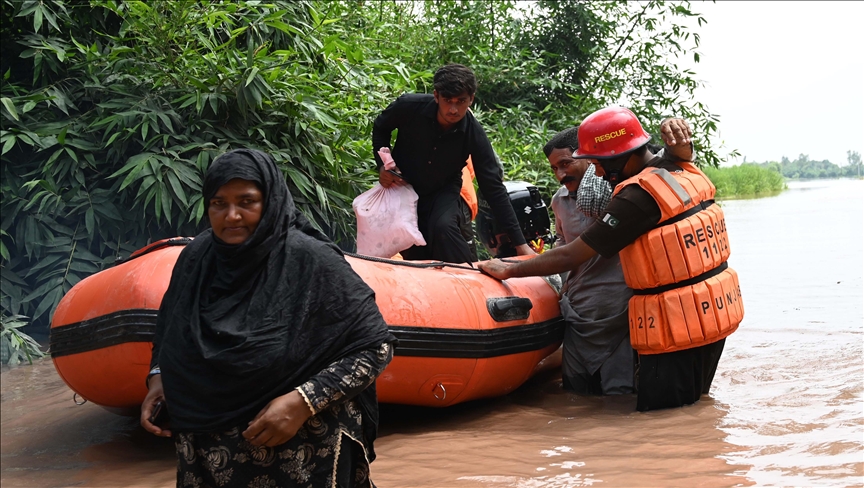Pakistan's premier stresses need for new water storage facilities as floods wreak havoc in Punjab province
'Unfortunately, Pakistan is one of the 10 countries most affected by climate change. Its impact will grow in the coming years, so we need immediate action to control the situation,' says Shehbaz Sharif
 Pakistani rescue workers evacuate flood victims to a safer place through boats in Sargodha, Punjab province, Pakistan, on August 28, 2025.
Pakistani rescue workers evacuate flood victims to a safer place through boats in Sargodha, Punjab province, Pakistan, on August 28, 2025.
ISLAMABAD
Pakistan Prime Minister Shehbaz Sharif on Thursday called for the construction of new water storage facilities as heavy floods wreaked havoc in the northeastern Punjab province following torrential rains and India's release of water from overflowing dams, which killed 13 people.
Premier Sharif, who visited the affected areas with federal ministers and Punjab Chief Minister Maryam Nawaz, emphasized the urgent need for new water reservoirs to address recurring challenges.
"Unfortunately, Pakistan is one of the 10 countries most affected by climate change. Its impact will grow in the coming years, so we need immediate action to control the situation," he said while speaking at an official meeting.
Recalling the devastating floods of 2022, which caused billions of dollars in losses and destroyed millions of acres of crops, Sharif stressed the necessity of increasing water storage capacity through projects such as the Bhasha and Mohmand dams, as well as smaller reservoirs in Punjab and the north.
Several towns near the three major rivers, Sutlej, Ravi, and Chenab, are at risk of catastrophic flooding, with hundreds of houses, shops, and roads inundated in low-lying areas of Wazirabad, Sialkot, Shahdara, Lahore, and Gujranwala.
While the Pakistan Meteorological Department warned of more rain in Punjab, the northwestern Khyber Pakhtunkhwa provinces, and other parts of the country beginning on Friday, which could last until September 2.
According to the National Disaster Management Authority (NDMA), 13 people have been killed and one injured in Punjab province, and another person has died in Pakistan-administered Kashmir as a result of a house collapse.
The flood has also caused significant damage to homes, crops, and infrastructure in Punjab province. However, Chief Minister Maryam Nawaz said rescue and relief teams are currently conducting operations, and that a damage assessment survey will be conducted once the water recedes.
During a briefing to Prime Minister Sharif, NDMA Chairman Lt. Gen. Inam Haider Malik warned that monsoon intensity could increase by 22% next year.
"This year, cloudbursts and melting glaciers have caused huge damage in the northern and northwestern regions of the country," he said, describing it as an "unprecedented" scenario.
Pakistani authorities also sent the army to Punjab on Wednesday to help with rescue and relief efforts, after New Delhi warned Islamabad about expected high inflows in the Sutlej, Ravi, and Chenab rivers.
India and Pakistan have been battered by relentless monsoon rains and flooding in recent weeks, with over 500 people killed in Pakistan since August 14, mostly over 400 in northwestern Khyber Pakhtunkhwa province, and 819 killed across Pakistan since June 26.
Anadolu Agency website contains only a portion of the news stories offered to subscribers in the AA News Broadcasting System (HAS), and in summarized form. Please contact us for subscription options.







